Search results for "paavo"
Take, eat
30 September 1994 | Archives online, Authors, Extracts, Interviews, Non-fiction
Annika Idström interviewed by Tuva Korsström; from Berättelsernas återkomst (The return of the narratives, Söderströms, 1994), a series of interviews, by Tuva Korsström, with contemporary European writers
Tuva Korsström: If one looks at what you have written, it’s had to do with things that no one talks about: mother-hatred, father-fixation, incest-fantasies; child-abuse and maltreatment of women… In general it’s always the unpleasant and depressing things that are made taboo: all our effort goes into normalising life according to a norm of niceness. Yet all these terrible things are there in our subconscious. You bring them out into the light, and it just can’t be very nice. You talk about what we’ve kept secret. Your method can perhaps be compared to psychoanalysis.
Annika Idström: My most recent book is about love, or rather about the possibility of love. It takes its origin not in an image but in my intensive reading of the Swedish psychoanalyst Jurgen Reeder’s book Begär och etik (‘Desire and ethics’).
It’s surprising that psychoanalysis wants to stubbornly cling to the simple idea that love is something the subject in a teleological sense ‘matures’ into unless its path of development has been hedged around by too many difficulties and disappointments. It’s surprising that people go in search of a discourse about love’s fundamental or innate harmony, when instead it ought to be obvious that what we call love is in the best case a ‘symptom’, behind which the individual finds himself torn apart by disparate forces.
Begär och etik
The Poet as a Progressive
30 September 1979 | Archives online, Authors
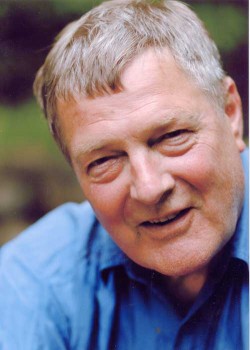
Claes Andersson. Photo: Johan Bargum.
Why do some poets adopt a chill tone or an intellectual stance, while others bleed in public, clench their fists or bellow with pain? Temperament alone cannot explain this. Poetical traditions, and the current climate, are more influential.
Modern Swedish poetry – in fact all Scandinavian poetry, including that of Finland – has inclined toward German and Continental Expressionism. This is, in essence, a romantic tradition, and there are other, more endogenous romantic traditions, as well, driving poets the same way. In such an ambience any pronouncedly intellectual poet will always seem exceptional. He will risk being accused of aloofness or disdain, be easily damned as a ‘difficult’ writer. Rabbe Enckell and Paavo Haavikko in Finland, Gunnar Ekelöf in Sweden, are cases in point.
Claes Andersson (born 1937) seems to belong to this category. He certainly tells his readers where he stands, unapologetically. But he is also a lover of his language – the Swedish spoken in Finland – and he likes to play intellectual games with the language, to coin a word or a phrase and turn it over, sometimes upside-down, to reflect and comment on the language itself: ‘Words,’ he once wrote, ‘possess hidden valences – shown, for instance, when the word Sodium jumps into the word Water to cool itself, never suspecting what will happen. Hidden tensions may thus be disclosed.’ More…
Beyond good and evil?
30 June 1987 | Archives online, Authors, Interviews
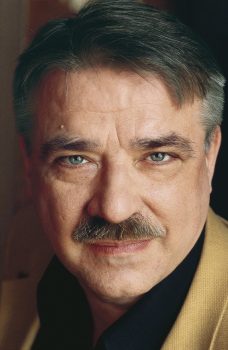
Esa Sariola. Kuva Irmeli Jung
Markku Huotari interviews Esa Sariola
A stylish restaurant in the Stock Exchange building in Helsinki. Esa Sariola and I order a businessmen’s lunch. We talk about hard-nosed success stories. About technocracy, casino economics.
About profit.
A steely-eyed businessman enters the room from the stock exchange and sees us two soft-talkers, even if we look like men, wasting time. The ruthless gambler bolts down his lunch and disappears to the upper floor again, where he is making money.
We remain.
We’re just talking.
And there’s no money accruing in our wallets.
All the same we have a grip on that investor. Esa Sariola has already laid siege to people like him in three books: Väärinkäsityksiä (‘Misconceptions’, 1983), a collection of short stories, and two novels: Rakas ystävä (‘Dear friend’, 1985) and Kuolemaani saakka (‘Until my dying day’, 1986). More…
What makes a classic?
31 March 2004 | Archives online, Authors, Reviews
In the bicentenary year of Finland’s national poet, Johan Ludvig Runeberg, Pertti Lassila sets his work against the background of the country’s turbulent history
The fifth of February, birthday of Johan Runeberg (1804–1877), a Finnish poet who wrote in his native Swedish, was already a patriotic festival in the 19th century; lighted candles were set in the windows of the Grand Duchy of Finland. Late in the century, the custom became a silent protest against the measures which, in the opinion of Finns, represented Russian oppression and threatened the country’s autonomy. The candle tradition later moved to Finland’s independence day, 6 December.
When, in 1904, the centenary of Runeberg’s birth was celebrated, Russian pressure meant that this was a politically uncertain and dramatic period. A crisis developed when a Finnish student named Eugen Schauman, in the June of the same year, murdered the Russian governor general, Nikolai Ivanovitch Bobrikov, in Helsinki for political reasons. Runeberg’s centenary year gathered the nation around the poet who, more than any other in Finland, was the symbol of love of the country. The first systematic translation project for the rendering of Runeberg’s work into Finnish was also in progress. More…
Question time
30 June 2006 | Archives online, Authors
Ei. Siis kyllä (‘No. That is to say, yes’, WSOY, 2006) by Paavo Haavikko, the incredibly productive and versatile grand old man of Finnish letters, is a series of apothegms – ‘short, witty, instructive sayings,’ according to your basic dictionary definition. Formally, these may remind one of the Egyptian-born French writer Edmond Jabès’s works, Le Livre des Questions (The Book of Questions), but is not so much a book of questions as it is a book of statements.
As the editor and translator of a number of Haavikko’s works over the past forty years, including two versions of a Selected Poems, two prose works, and, most recently, Kaksikymmentä ja yksi (One and Twenty), a wild mock epic of a band of Finnish Vikings travelling down to Constantinople and on to Africa, I have gained familiarity with the poet’s favourite images and strategies. He employs indirection and ambiguity with great skill:
‘There is no answer without a question, and without knowing the question you cannot understand the answer. But it has always been our habit to ask the question ourselves, then answer it ourselves. That is the only way to gain scientifically valid answers. Therefore, questions must be constructed with exactitude, to prevent their turning into answers.’ More…
A life of letters
30 September 1995 | Archives online, Authors
Death is a central theme in the poetry of Eeva-Liisa Manner (1921–1995). In many poems she described the proximity of death and the last frontier in order to conquer death and laugh at it – often grimly, sometimes cheerlessly.
But actually I died ages ago,
and when death comes, when it strikes
the body that wears my clothes,
it's all a predestined rendezvous:
movement stops, words scatter like snow,
the eyes' apparitions
are off like a flight of pigeons....
Manner wrote in a collection entitled Niin vaihtuvat vuoden ajat (‘So change the seasons’), which appeared as early as 1964. More…
Builder of words
31 December 1988 | Archives online, Authors
The poet Lauri Viita (1916–1965) was a master of rhyme and rhythm, a linguistic sorcerer who, for that reason, has been little translated into other languages. He also gave his home of Pispala, a suburb of Tampere, a lasting place in Finnish literature with his novel Moreeni (‘Moraine’)
In the course of a couple of years after the Second World War Finnish poetry altered unrecognisably. The old post-symbolic poetry with its artful end rhymes suddenly seemed old-fashioned and its diction hackneyed. The new poets, Paavo Haavikko foremost among them, wrote a great variety of texts, abandoning fixed rhythms and end rhymes. The circle of adherents to the ‘old’ poetry seemed to be restricted to poets who had begun their careers before the war; almost all the younger writers followed the new direction.
There was, nevertheless, one exception: Lauri Viita (1916–1965). Making his first appearance in Finnish poetry in 1947 with a volume entitled Betonimylläri (‘Concrete mixer’), he was able to breathe new life into many of the stylistic forms of traditional poetry: he used end rhymes in a way that had never been seen before and brought into his poems words that had previously been avoided; he demonstrated himself to be a master of rhythm, with a totally individual ability to paint with vowels and hammer home combinations of consonants to their greatest effect; he brought to poetry new attitudes and subjects, above all the fresh, unself-conscious rhythms of speech. More…
Lest your shadow fade
31 March 1987 | Archives online, Fiction, Prose
An extract from the novel Jottei varjos haalistu (‘Lest your shadow fade’, 1987). Interview by Erkka Lehtola
‘… learn, then, to like yourself.
Dancing beside your shadow, laugh and play.
Dance always in the sunlight, lest your shadow fade.’J. Fr. Erlander, 1876 (Erika Kuovinoja’s grandfather)
‘Tis in life’s hardness that its splendour lies.’
J. Fr. E., 1890
Three days before the date fixed for the funeral, the minister directed his steps towards the home of the deceased, trying, as he walked, to compose his thoughts, which were full of righteous Lutheran anger. There were many good reasons for this. On the other hand, nothing that had happened in the past ought to make any difference, now that he was on his way to visit a house of mourning. A visit that called for the exercise of understanding, and even, if possible, kindness. It was a lot for anyone to expect, even of a clergyman. It was not by his own desire that he was paying this call: it was a matter of duty. And this time he was the protagonist. Petulantly, his shoes crunched the gravel. More…
A poet’s perspective
31 December 1986 | Archives online, Authors, Reviews
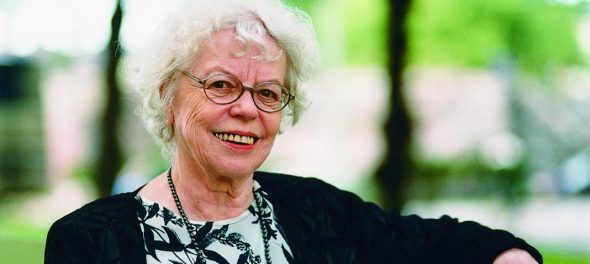
Aila Meriluoto. Photo: Pertti Nisonen
When Aila Meriluoto burst on to the world of Finnish poetry 40 years ago in the autumn of 1946 she was at once hailed as a youthful prodigy. Praised lavishly by the leading critics, the 22-year-old poet’s first collection, Lasimaalaus, sold in phenomenal numbers: in a couple of years it went through eight editions, or 25,000 copies, which in Finland is still a record figure. Today total sales are well over 30,000.
Two poems attracted particular attention. One was Kivinen Jumala (‘God of stone’), a poem of defiance unleashed by the experience of wartime bombing, in which God is portrayed as having changed into a stone statue, and people as having hardened correspondingly. It was the first reaction of the younger generation to the war – abusive, strong and inevitable, the proclamation of the death of the kind, just God.
The other central poem of the collection was Lasimaalaus (‘Stained glass’) from which the collection took its name: a taut post-symbolist vision and a dazzling synthesis of the oneness of the world. Baudelaire, master of correspondances, might well have been satisfied with it. More…
Life and sun: the writer and his time
30 June 1988 | Archives online, Authors
Frans Emil Sillanpää (1888–1964), one of Finland’s most read authors, was born in the parish of Hämeenkyrö, amid the farmlands of Western Finland. In forty years he published twenty works: novels and short stories. He was awarded the Nobel Prize in 1939; his works have been translated into more than two dozen languages. His centenary year produced exhibitions, lectures, publications, readings, radio and stage plays, radio and television programmes.
Sillanpää, biologist, realist and mystic: literary scholars in Finland have always disputed about his qualities as an author. Depth psychology, D.H. Lawrence, nature lyricism, Henri Bergson, deep-rooted peasant philosophy, intertextuality, life worship – all can be found in Sillanpää’s work. Modern or old fashioned, a regional writer, or an internationally renowned Nobel Prize author?
From time to time the world press prints survey assessments, rather like score cards, of the Nobel literature prizes. They are usually intended to rap the knuckles of the Swedish Academy, but at the same time they attach a value on the international literary market to the recipients of the awards.
Finland’s only Nobel laureate, F.E. Sillanpää, who received his prize in 1939, seems at present to rate low internationally. Writers awarded the prize at around the same time seem, it is true, to have suffered a similar fate: his predecessor Pearl S. Buck, and his post-war successors Johannes V. Jensen and Gabriela Mistral, although the latter do have their own purely local importance. There are some literary histories that allow Sillanpää just a couple of lines along with other regionalists and describers of peasant life, such as the Pole Władysław Reymont, Charles-Ferdinand Ramuz of Switzerland, and Jean Giono of France. More…
The stars above
6 March 2014 | Authors, Reviews
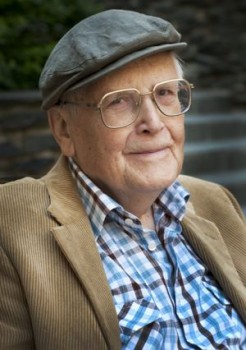
Lars Huldén. Photo: Charlotta Boucht
The state of poetry in Finland has been the subject of heated debate in recent years. The focus of much of this attention has been so-called ‘experimental poetry’. Some commentators have gone as far as to suggest that, in its ability to reshape and reinvent itself, contemporary poetry serves as a model for other forms of literature.
In such a literary climate, a writer like Lars Huldén might easily be overlooked, a writer whose poems give honest expression to thoughts and moods. This Huldén achieves in a manner that is at once recognisable and inventive. His poems are, perhaps, close to what many assume poems should be: concise speech expressing the wisdom of experience and often revealing a clear sense of resignation – which is hardly surprising when you have reached the age of 88. More…
In memoriam Anselm Hollo 1934–2013
1 February 2013 | In the news
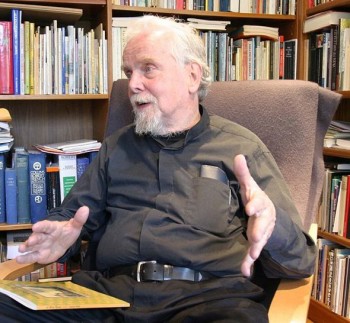
Anselm Hollo. Photo: Gloria Graham; taken during the video taping of Add-Verse, 2005. (Wikipedia)
Poet and translator Anselm Hollo died in Boulder, Colorado, on 29 January, at the age of 78. His father, Professor J.A. Hollo, translated literature from 14 languages. Anselm, born in Helsinki in 1934, worked with languages all his life, translating from Finnish, English, German, Swedish and French.
In the 1950s he lived in Germany and Austria, and then moved to England to work for the BBC. He published his first collection of poems, Sateiden välillä (‘Between rains ’), in Finnish in 1956. He once said that as a poet he ‘makes things in and out of language’.
In the late 1960s Anselm moved to the United States, where he was to write more than 30 books in English. He was a Professor of Writing and Poetics at Naropa University in Boulder, where he lived with his second wife, the visual artist Jane Dalrymple-Hollo. His own poetry is influenced by the 1950s and 1960s Beat Generation, among whom he had several personal friends; he translated Allen Ginsberg and Robert Creeley into Finnish – as well as the two books of poetry by John Lennon.
His last work remains Guests of Space (Coffee House Press, 2007). Notes on the Possibilities and Attractions of Existence: New and Selected Poems 1965–2000 received the San Francisco Poetry Center’s Book Award for 2001. His collection Corvus (2002) was also published in Finland, translated by Kai Nieminen. Among the many literary prizes he received was the Finnish Government Prize for the Translation of Finnish Literature in 1996.
Among his best-known translations of Finnish poetry are poems by Pentti Saarikoski (1937–1983) and Paavo Haavikko (1931–2008), whose work he also translated into German. For many years he served as a member of the literary advisory board of Books from Finland, and translated new work by, for example, Lassi Nummi, Jarkko Laine, Rosa Liksom, Leena Krohn and Riina Katajavuori.
During Anselm and Jane’s visits to Finland it was always enjoyable to talk about literature, art, new books and translation over a glass of wine. Anselm rarely, if ever, said no to requests to translate something: he remained sincerely interested in his native language and the ways it was used for creating fiction. We miss a jovial friend and an exceptionally skilful man of letters.
![]()
i.m. Hannes Hollo, 1959–1999
by Anselm Hollo
(Hannes Hollo was his son from the first marriage with poet Josephine Clare)
Fought the hungry ghosts here on Earth
‘What is man?’ asked the King
Alcuin’s reply: ‘A guest of space.’ And time yes time:
The past lies before us, the future comes up from behind
Walking on Primrose Hill or Isle of Wight beaches
Iowa City streets scrambling up snow-covered deer track
To Doc Holliday’s grave in Glenwood Springs
His helmet now shall make a hive for bees
He fought the hungry ghosts here on Earth
Strong & resourceful on his best days,
Patient kind and presente
Returning those with him to here & now
But just as we settle in with our Pepsi and popcorn
THE END rolls up too soon always too soon
![]()
(Anselm reads the poem here)
Concrete dreams
30 September 1986 | Archives online, Authors, Reviews
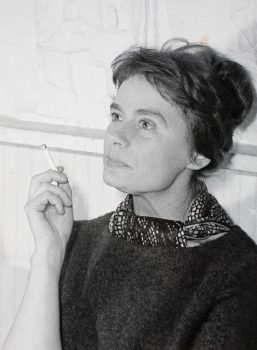
Marja-Liisa Vartio. Photo: SKS archives
Pirkko Alhoniemi on Marja-Liisa Vartio’s works
Although it is now 20 years since the death of Marja-Liisa Vartio (1924-1966), her writing remains as vivid as ever. Her books are regarded as classics of modern Finnish prose, and they constantly attract new readers, as the demands for reprints testify. Vartio’s style has not lost its freshness, nor her social vision its edge, even in the teeth of the aggressive feminism of the 1980s.
It is a little difficult to gauge the secret of her continued popularity. Although the main character of her novels is always a woman, Vartio cannot really be seen as a champion of the feminine point of view. Most essential and at the same time paradoxical in her work is perhaps the fact that, from a purely Finnish starting point, she is able to give valuable insights into the general change in world view that followed the Second World War. More…
-
Search our archives
-
You can search for texts using author names or free search terms, and filter categories or tags.
Find texts matching either just one search term (OR query) or require all words to appear (AND query). Use quotes when searching for phrases, for example "search phrase".
-
-
Yearly archive
-
List of authors and contributors
- Abu-Hanna, Umayya
- Ågren, Gösta
- Aho, Hannu
- Aho, Juhani
- Aho, Claire & Westö, Kjell
- Ahola, Suvi
- Ahti, Risto
- Ahtola-Moorhouse, Leena
- Ahvenjärvi, Juhani
- Ala-Harja, Riikka
- Alftan, Maija
- Alhoniemi, Pirkko
- Anderson, John
- Andersson, Claes
- Andersson, Jan-Erik
- Andtbacka, Ralf
- Anhava, Tuomas
- Antas, Maria
- Apunen, Matti
- Aro, Tuuve
- Aronpuro, Kari
- Autio, Milla
- Bargum, Johan
- Bargum, Marianne
- Barrett, David
- Binham, Philip
- Björling, Gunnar
- Blau DuPlessis, Rachel
- Bolgár, Mirja
- Boucht, Birgitta
- Bremer, Caj
- Bremer, Stefan
- Brotherus, Elina & Ala-Harja, Riikka
- Byggmästar, Eva-Stina
- Canth, Minna
- Carlson, Kristina
- Carpelan, Bo
- Chan, Stephen
- Chorell, Walentin
- Diktonius, Elmer
- Ekman, Michel
- Ekroos, Anna-Leena
- Enckell, Agneta
- Enckell, Martin
- Enqvist, Kari
- Envall, Markku
- Eskola, Kanerva
- Fagerholm, Monika
- Flint, Austin
- Forsblom, Harry
- Forsblom, Sabine
- Forsström, Tua
- Gothóni, Maris
- Granö, Veli
- Gripenberg, Catharina
- Gröndahl, Satu
- Grünthal, Satu
- Haanpää, Pentti
- Haapala, Vesa
- Haasjoki, Pauliina
- Haatanen, Kalle
- Haavikko, Paavo
- Hämäläinen, Helvi
- Hämäläinen, Timo
- Hännikäinen, Timo
- Hänninen, Anne
- Hannula, Risto
- Harju, Timo
- Härkönen, Leena
- Harmaja, Saima
- Hassinen, Pirjo
- Havukainen, Aino & Toivonen, Sami
- Hawkins, Hildi
- Heikkilä-Halttunen, Päivi
- Heikkonen, Olli
- Heinimäki, Jaakko
- Hejkalová, Markéta
- Hellaakoski, Aaro
- Hertzberg, Fredrik
- Hiidenheimo, Silja
- Hiltunen, Eija Irene
- Hökkä, Tuula
- Holappa, Pentti
- Hollo, Anselm
- Holmström, Johanna
- Honkala, Juha
- Hotakainen, Kari
- Huldén, Lars
- Huotari, Markku
- Huotarinen, Vilja-Tuulia
- Huovi, Hannele
- Huovinen, Veikko
- Hurme, Juha
- Hyry, Antti
- Idström, Annika
- Ingström, Pia
- Inkala, Jouni
- Isomäki, Risto
- Istanmäki, Sisko
- Itkonen, Jukka
- Jalonen, Olli
- Jama, Olavi
- Jansson, Tove
- Järnefelt, Arvid
- Järvelä, Jari
- Järvinen, Outi
- Jeremiah, Emily
- Joenpelto, Eeva
- Joenpolvi, Martti
- Joensuu, Matti Yrjänä
- Jokela, Markus
- Jokinen, Heikki
- Jokisalo, Ulla & Kortelainen, Anna
- Jones, W. Glyn
- Jotuni, Maria
- Juntunen, Tuomas
- Juvonen, Helvi
- Kähkönen, Sirpa
- Kaila, Tiina
- Kaipainen, Anu
- Kanto, Anneli
- Kantokorpi, Mervi
- Kantokorpi, Otso
- Kantola, Janna
- Karlström, Sanna
- Karonen, Vesa
- Katajavuori, Riina
- Katz, Daniel
- Kihlman, Christer
- Kiiskinen, Jyrki
- Kilpi, Eeva
- Kilpi, Volter
- Kinnunen, Aarne
- Kirstinä, Leena
- Kirstinä, Väinö
- Kirves, Jenni
- Kivi, Aleksis
- Knapas, Rainer
- Kokko, Karri
- Kokko, Hanna & Bargum, Katja
- Kontio, Tomi
- Korhonen, Riku
- Korsström, Tuva
- Koskela, Lasse
- Koskelainen, Jukka
- Koskimies, Satu
- Koskinen, Sinikka
- Krohn, Leena
- Kulmala, Teppo
- Kunnas, Kirsi
- Kupiainen, Teemu & Bremer, Stefan
- Kurkijärvi, Gene
- Kuusisto, Stephen
- Kylätasku, Jussi
- Kyrö, Tuomas
- Kytöhonka, Arto
- Laaksonen, Heli
- Lahtela, Markku
- Lahti, Leena
- Laine, Jarkko
- Laitinen, Kai
- Lander, Leena
- Lassila, Pertti
- Laurén, Anna-Lena
- Leche, Johan & Grysselius, Johan
- Lehtola, Erkka
- Lehtola, Jyrki
- Lehtonen, Joel
- Lehtonen, Soila
- Leka, Kaisa
- Lesser, Rika
- Liehu, Rakel
- Liksom, Rosa
- Lilius, Carl-Gustav
- Lindberg, Petter
- Lindblad, Kjell
- Lindgren, Minna
- Lindgren, Minna & Löytty, Olli
- Lindén, Zinaida
- Linna, Väinö
- Lintunen, Maritta
- Liukkonen, Leena
- Liukkonen, Tero
- Lomas, Herbert
- London, Mindele
- Lounela, Pekka
- Löytty, Olli
- Lundberg, Ulla-Lena
- Luntiala, Hannu
- Lydecken, Arvid
- Määttänen, Markus
- Mäkelä, Hannu
- Mäkinen, Raine
- Malkamäki, Sari
- Manner, Eeva-Liisa
- Mannerkorpi, Juha
- Manninen, Teemu
- Marttila, Hannu
- Marttila, Mervi
- Mauriala, Vesa
- Mazzarella, Merete
- McDuff, David
- Mehto, Katri
- Melleri, Arto
- Meri, Veijo
- Meriluoto, Aila
- Metsähonkala, Mikko
- Mickwitz, Peter
- Mikkola, Marja-Leena
- Mikkonen, Sari
- Mörö, Mari
- Musturi, Tommi
- Neovius Deschner, Margareta
- Nevala, Maria-Liisa
- Nevanlinna, Arne
- Nevanlinna, Tuomas
- Niemi, Irmeli
- Niemi, Juhani
- Nieminen, Kai
- Nieminen, Pertti
- Nissilä, Anna-Leena
- Nordell, Harri
- Nordgren, Ralf
- Nummi, Jyrki
- Nummi, Lassi
- Nummi, Markus
- Oja, Vesa
- Oksanen, Aulikki
- Oksanen, Kimmo
- Olsson, Hagar
- Onerva, L
- Onkeli, Kreetta
- Orlov, Janina
- Otonkoski, Lauri
- Paasilinna, Arto
- Paasilinna, Erno
- Pääskynen, Markku
- Paasonen, Markku
- Paasonen, Ranya
- Päätalo, Kalle
- Paavolainen, Nina
- Pakkala, Teuvo
- Paksuniemi, Petteri
- Palmgren, Reidar
- Papinniemi, Jarmo
- Parland, Henry
- Parras, Tytti
- Parvela, Timo
- Pekkanen, Toivo
- Peltonen, Juhani
- Pennanen, Eila
- Petäjä, Jukka
- Petterson, Viktor
- Pettersson, Joel
- Peura, Annukka
- Peura, Maria
- Pimenoff, Veronica
- Pirilä, Marja
- Pohjola-Skarp, Riitta
- Polkunen, Mirjam
- Pulkkinen, Matti
- Pyysalo, Joni
- Raevaara, Tiina
- Raittila, Hannu
- Rajala, Panu
- Rane, Irja
- Rapo, Jukka & Rotko, Lauri, Jukka
- Rasa, Risto
- Rekola, Mirkka
- Riikonen, H.K.
- Rimminen, Mikko & Salokorpi, Kyösti
- Ringbom, Henrika
- Ringell, Susanne
- Rintala, Paavo
- Roine, Raul
- Roinila, Tarja
- Rönkä, Matti
- Rönnholm, Bror
- Rossi, Matti
- Runeberg, Fredrika
- Runeberg, Johan Ludvig
- Ruohonen, Laura
- Ruuth, Alpo
- Saarikangas, Kirsi
- Saarikoski, Pentti
- Saarikoski, Saska
- Saaritsa, Pentti
- Sahlberg, Asko
- Saint-Germain, Claire
- Saisio, Pirkko
- Salama, Hannu
- Sallamaa, Kari
- Salmela, Aki
- Salmela, Alexandra
- Salmenniemi, Harry
- Salminen, Arto
- Salminiitty, Satu
- Salo, Merja
- Sammallahti, Pentti & Thrane, Finn
- Sandelin, Peter
- Sandman Lilius, Irmelin
- Säntti, Maria
- Sariola, Esa
- Sarkia, Kaarlo
- Saurama, Matti
- Savolainen, Mikko
- Saxell, Jani
- Schatz, Roman & Jarla, Pertti
- Schildt, Runar
- Schoolfield, George C.
- Seppälä, Arto
- Seppälä, Juha
- Siekkinen, Raija
- Sihvo, Hannes
- Sihvonen, Lauri
- Sillanpää, Frans Emil
- Sillanpää, Johanna
- Simonsuuri, Kirsti
- Sinervo, Helena
- Sinisalo, Johanna
- Sirola, Jouko
- Sironen, Esa
- Skiftesvik, Joni
- Snellman, Anja
- Snickars, Ann-Christine
- Södergran, Edith
- Söderling, Trygve
- Statovci, Pajtim
- Stenberg, Eira
- Strandén, Tiia
- Sund, Lars
- Suosalmi, Kerttu-Kaarina
- Susi, Heimo
- Susiluoto, Saila
- Svedberg, Ingmar
- Tähtinen, Tero
- Tahvanainen, Sanna
- Takala, Riikka
- Tamminen, Petri
- Tapio, Juha K.
- Tapola, Katri
- Tapola, Katri & Talvitie, Virpi
- Tarkka, Pekka
- Taskinen, Satu
- Tate, Joan
- Tavi, Henriikka
- Tervo, Jari
- The Editors
- Thölix, Birger
- Tietäväinen, Ville
- Tiihonen, Ilpo
- Tikka, Eeva
- Tikkanen, Henrik
- Tikkanen, Märta
- Tirkkonen, Sinikka
- Toivio, Miia
- Topelius, Zachris
- Tossavainen, Jouni
- Tuomi, Panu
- Tuominen, Maila-Katriina
- Tuominen, Mirjam
- Turkka, Jouko
- Turkka, Sirkka
- Turtiainen, Arvo
- Turunen, Heikki
- Tuuri, Antti
- Tynni, Aale
- Tyyri, Jouko
- Urbom, Ruth
- Uschanov, Tommi
- Utrio, Kaari
- Vainio, Väinö
- Vainonen, Jyrki
- Väisänen, Hannu
- Vakkuri, Juha
- Vala, Katri
- Valkeapää, Nils-Aslak
- Valkonen, Kaija
- Valoaalto, Kaarina
- Valtaoja, Esko
- Vartio, Marja-Liisa
- Venho, Johanna
- Verronen, Maarit
- Viikari, Auli
- Viita, Lauri
- Virkkunen, Juha
- Virolainen, Merja
- Virtanen, Arto
- Vuoristo, Sari
- Wahlström, Erik
- Waltari, Mika
- Warburton, Thomas
- Westerberg, Caj
- Westö, Kjell
- Westö, Mårten
- Widén, Gustaf
- Willamo, Heikki
- Willner, Sven
- Witesman, Owen
- Zilliacus, Clas
- von Koskull, Agneta
- von Schoultz, Solveig
© Writers and translators. Anyone wishing to make use of material published on this website should apply to the Editors.
